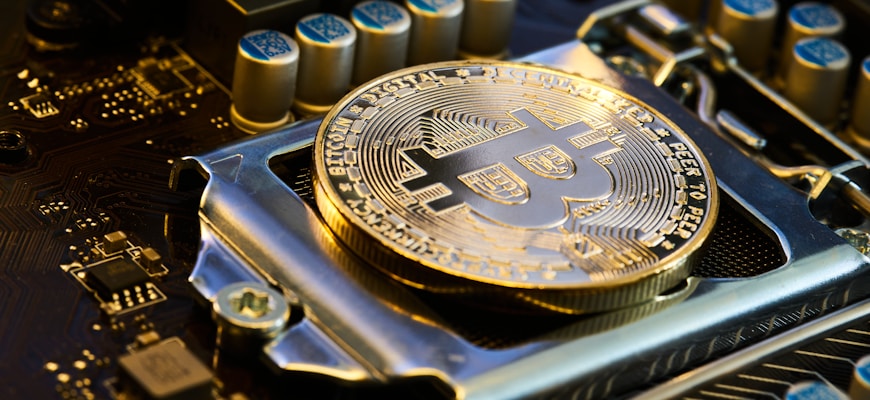The Role of Mining in Cryptocurrency Networks: A Beginner’s Guide

- Understanding the Basics of Cryptocurrency Mining
- Exploring the Connection Between Mining and Cryptocurrency Networks
- The Importance of Mining in Securing Cryptocurrency Transactions
- How Miners Earn Rewards in Cryptocurrency Networks
- Challenges and Opportunities in the World of Cryptocurrency Mining
- Tips for Beginners Looking to Get Started in Cryptocurrency Mining
Understanding the Basics of Cryptocurrency Mining
Cryptocurrency mining is the process by which new transactions are added to a blockchain through the verification of these transactions. Miners use powerful computers to solve complex mathematical problems that validate these transactions. This process requires a significant amount of computational power and energy.
Miners are rewarded with newly minted coins for their efforts in securing the network and processing transactions. This reward serves as an incentive for miners to continue participating in the mining process. The more computational power a miner contributes to the network, the higher their chances of being rewarded.
There are different consensus algorithms used in cryptocurrency mining, such as Proof of Work (PoW) and Proof of Stake (PoS). PoW requires miners to solve complex mathematical problems to validate transactions, while PoS involves validators who are chosen to create new blocks based on the number of coins they hold.
It is important to note that cryptocurrency mining can be a competitive and resource-intensive process. Miners must invest in specialized hardware and software to effectively mine cryptocurrencies. Additionally, the increasing complexity of mining algorithms requires miners to constantly upgrade their equipment to stay competitive.
Exploring the Connection Between Mining and Cryptocurrency Networks
One of the key components of cryptocurrency networks is mining, a process that involves verifying transactions and adding them to the blockchain. Mining plays a crucial role in maintaining the security and integrity of these networks by preventing double-spending and ensuring consensus among all participants.
Mining is often associated with the process of creating new coins, but its primary function is to validate transactions. Miners use powerful computers to solve complex mathematical puzzles, which requires a significant amount of computational power. In return for their efforts, miners are rewarded with newly minted coins and transaction fees.
The connection between mining and cryptocurrency networks is essential for the functioning of these digital currencies. Without miners, transactions would not be processed, and the entire network would grind to a halt. As more miners join the network, the difficulty of mining increases, ensuring a steady flow of new blocks being added to the blockchain.
Furthermore, mining also plays a crucial role in decentralizing cryptocurrency networks. By distributing the task of verifying transactions among a network of miners, no single entity can control the entire network. This decentralized nature is one of the key reasons why cryptocurrencies are considered to be secure and resistant to censorship.
In conclusion, mining is a fundamental aspect of cryptocurrency networks, providing security, decentralization, and incentivizing participation. Understanding the connection between mining and cryptocurrencies is essential for anyone looking to delve into the world of digital currencies.
The Importance of Mining in Securing Cryptocurrency Transactions
Mining plays a crucial role in ensuring the security and integrity of transactions within cryptocurrency networks. In simple terms, mining is the process by which transactions are verified and added to the public ledger known as the blockchain. This process involves solving complex mathematical problems using computer hardware, which requires a significant amount of computational power.
One of the primary reasons why mining is essential for securing cryptocurrency transactions is its role in preventing double-spending. Double-spending is a potential threat in digital currencies where the same funds are used for multiple transactions. By validating transactions through mining, the network ensures that each unit of cryptocurrency is only spent once, maintaining the integrity of the system.
Additionally, mining helps to decentralize the network and prevent any single entity from gaining control over the majority of the network’s computing power. This decentralization is a foundational principle of most cryptocurrencies, as it ensures that no single entity can manipulate the system for their gain. Without mining, the network would be vulnerable to attacks and manipulation by malicious actors.
Furthermore, mining incentivizes participants to contribute their computing power to the network by rewarding them with newly minted coins. This process not only helps to secure transactions but also ensures the continued operation and growth of the network. Miners play a crucial role in maintaining the health and security of cryptocurrency networks, making mining an indispensable component of the ecosystem.
How Miners Earn Rewards in Cryptocurrency Networks
One of the key aspects of mining in cryptocurrency networks is how miners earn rewards for their efforts. Miners play a crucial role in securing the network and validating transactions. In return for their work, they are rewarded with newly minted coins as well as transaction fees. This incentivizes miners to continue to participate in the network and ensures its security and integrity.
To earn rewards in cryptocurrency networks, miners compete to solve complex mathematical puzzles through a process known as proof of work. This involves using computational power to find a specific hash value that meets certain criteria. The first miner to solve the puzzle and add a new block to the blockchain is rewarded with a set amount of coins. This process is known as mining and is essential for the functioning of most cryptocurrency networks.
In addition to block rewards, miners also earn transaction fees for including transactions in the blocks they mine. Users can choose to attach a fee to their transactions to incentivize miners to prioritize them. This creates a competitive market for block space, with miners selecting transactions based on the fees attached to them. By earning both block rewards and transaction fees, miners are able to profit from their participation in the network.
Overall, the process of how miners earn rewards in cryptocurrency networks is a fundamental aspect of how these networks operate. By incentivizing miners to secure the network and validate transactions, cryptocurrencies are able to function in a decentralized and secure manner. This system of rewards ensures that miners are motivated to continue their work, contributing to the overall success of the network.
Challenges and Opportunities in the World of Cryptocurrency Mining
Cryptocurrency mining presents both challenges and opportunities for those involved in this sector. One of the main challenges is the high energy consumption associated with mining operations. As the network grows, so does the computational power required to mine new coins, leading to a significant increase in electricity usage. This has raised concerns about the environmental impact of cryptocurrency mining.
On the other hand, there are also opportunities in the world of cryptocurrency mining. One of the most obvious opportunities is the potential for profit. Miners are rewarded with newly minted coins for their efforts in securing the network. Additionally, mining can provide a way for individuals to participate in the cryptocurrency ecosystem and contribute to the decentralization of the network.
Tips for Beginners Looking to Get Started in Cryptocurrency Mining
For beginners interested in getting started in cryptocurrency mining, there are a few important tips to keep in mind. First, it’s crucial to do thorough research on the different cryptocurrencies available for mining, as well as the hardware and software needed to mine them successfully. This will help you make informed decisions and avoid potential pitfalls along the way.
Secondly, consider joining a mining pool to increase your chances of earning rewards. Mining pools allow miners to combine their computational power and work together towards mining blocks more efficiently. This can be especially beneficial for beginners looking to make a profit from mining.
Another important tip is to stay updated on the latest trends and developments in the cryptocurrency mining industry. This includes keeping an eye on changes in mining algorithms, hardware advancements, and market fluctuations. By staying informed, you can adapt your mining strategy accordingly and maximize your profits.
Lastly, don’t forget to consider the environmental impact of cryptocurrency mining. Mining can be energy-intensive, so it’s essential to choose energy-efficient hardware and consider using renewable energy sources whenever possible. By being mindful of your environmental footprint, you can contribute to a more sustainable future for cryptocurrency mining.



